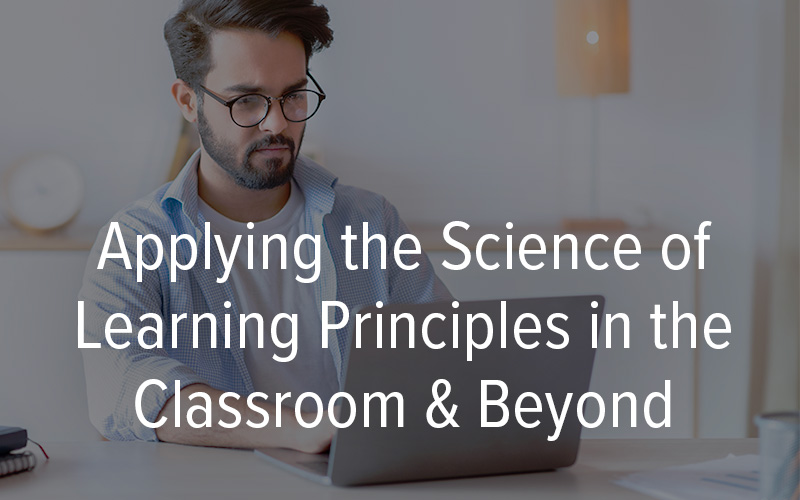
Cognitive science has ushered in a new era of training that has proven to accelerate learning and build longer-lasting memory. With so many learners struggling to keep up with the wealth of information coming at them, you may be wondering how to implement these latest principles that make learning stick and improve human performance.
Below, we’ve addressed three of the most significant challenges learners face and how you can apply the new principles of learning to overcome them. Whether you’re in the education, corporate, or healthcare industry, these tips will help you transform training into learning and understanding.
1. Flattening the Forgetting Curve: Start with Metacognition
Research shows that relying on reading assignments results in poor memory for the material—as little as 10% retention in many cases. The forgetting curve is to blame, and, unfortunately, It is steepest during the first 24 hours after learning something new.
Studies have shown that thinking about your learning, known as metacognition, is vital for retention. Contemplating what you think you know versus what might actually be true activates the parts of your brain tasked with memory formation. Metacognition sets learners up for success. Their brains will be firing for connected events, related objects, or familiar experiences that help them tie concepts together.
So ask learners if they are sure about their knowledge. Have them rate their certainty, uncertainty, and gaps on the topics you want them to remember for the long term.
2.Confidently Held Misinformation: Find It—Fix It
Confidence compels us into action—asking someone on a date, deciding on a new hire, or changing a patient’s central line. Our conviction about those decisions can result in some rather incredible outcomes, but only if we are actually correct. When our confidence is misplaced, it can be devastating. This is true for every environment where people use their knowledge to get things done—from agents in call centers to clinicians in hospitals to students in college.
Too often, learners feel confident in their knowledge after studying the material or re-reading their notes several times merely because it is familiar to them. In psychology, this is called familiarity bias. Unfortunately, learners who rely on traditional study methods are subject to familiarity bias, resulting in overconfidence in their knowledge. It seems counter-intuitive but studying, taking notes, and re-reading don’t overcome misinformation all that well, as it’s a strongly felt pattern of neurons in the brain.
So how can you remedy overconfidence? By first assessing your learner’s confidence in what they think they know and then remediating the confidently-held misinformation. Ask them how sure they are in their knowledge. Misinformation is emotional, and when learners are alerted to it, they have a strong desire to eradicate it. This is a psychological process known as hypercorrection, and it makes the correct information much more memorable and, hence, retrievable in the future.
3. Information Overload: Create a Culture of Learning
These days, learners are bombarded with information. When stressed or overwhelmed, it is natural for them to tune out. Stress, however, disrupts memory retrieval. That is why it is essential to create a culture of learning where learners feel safe to say they “don’t know” or to answer a question incorrectly.
Brain researchers discovered that the best learning occurs when classroom experiences are motivating and engaging. Learners experience these sorts of mental feelings with the release of the neurotransmitter dopamine, which occurs in the presence of a potential reward. Dopamine controls “seeking and wanting,” and focuses a learner on the activity that may deliver that reward in the future. Successful learning is just such a reward. For example, overcoming misinformation or closing a knowledge gap feels good. So give learners low-stakes quizzes, which will let them feel a reward in the form of correct answers. And people love status, so use public praise as an additional reward, being careful to not leave anyone out.
Self-testing is another technique proven to increase memory recall. Self-testing, also referred to as the testing effect, active recall, or retrieval practice—all use the same mechanism: asking your brain to retrieve stored information on cue. It has a powerful impact on long-term retention because when we forget, it’s not information storage that has weakened. The problem is really that the retrieval pathway to the stored information has weakened. Self-testing strengthens the retrieval pathway better than any other technique from cognitive psychology. So encourage self-testing with your students.
Measure training outcomes
Whatever training modality you use, traditional, hybrid, or online, make sure you measure effectiveness. Not just completion rates and scores—but whether it has had an impact on behavior and outcomes. You will see a measurable return on your training investment if you use these recently discovered principles to address three of the biggest challenges your learners face.







